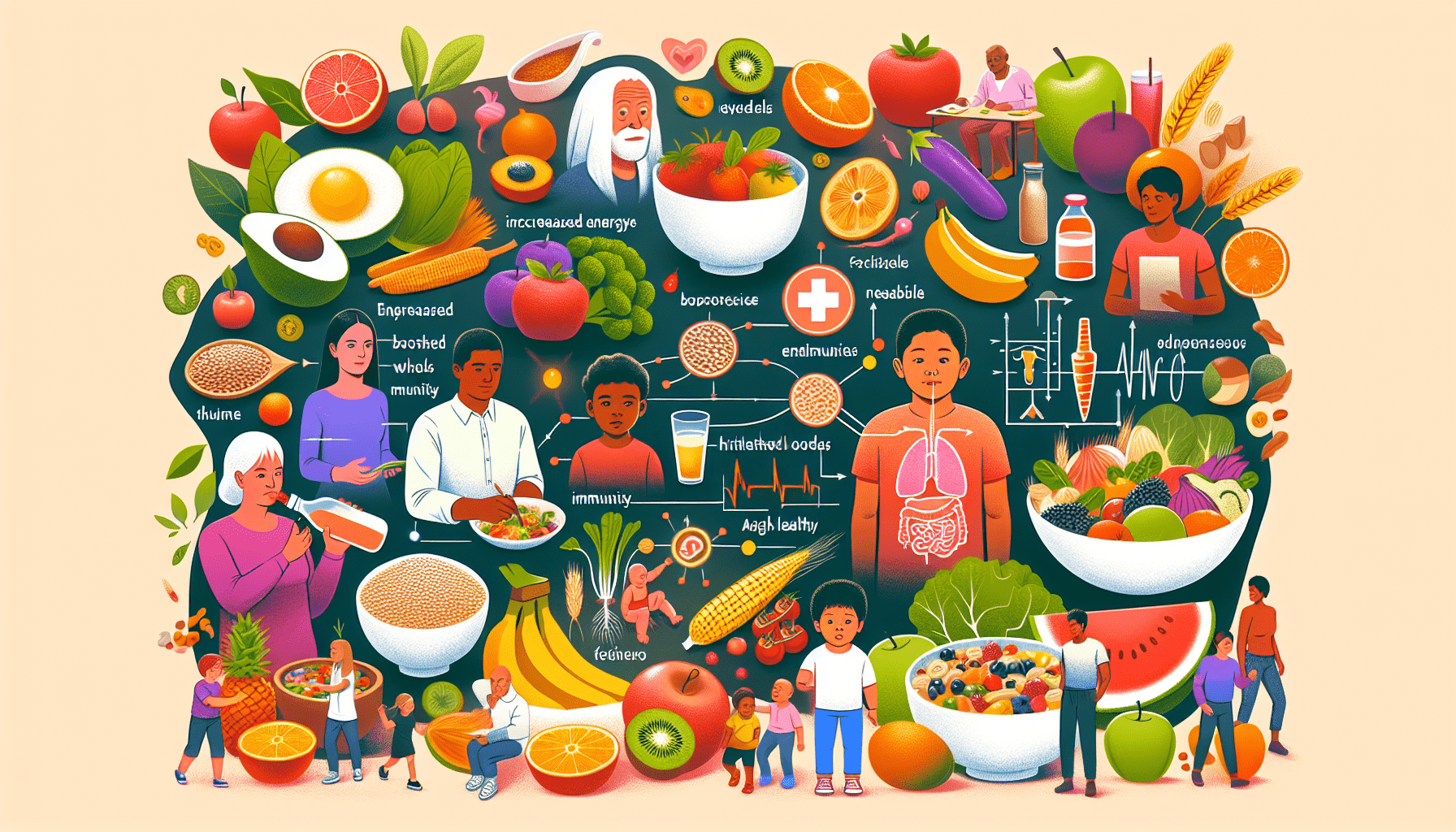Fueling Your Body: The Importance of Nutrition from Whole Foods
In a fast-paced world that often prioritizes convenience over quality, it’s crucial to pause and consider the impact of our food choices on our overall health. The importance of nutrition from whole foods cannot be overstated, as it provides our bodies with the essential nutrients they need to function optimally. By fueling ourselves with wholesome ingredients, we not only nourish our bodies but also set the foundation for a vibrant, energetic lifestyle. Join us as we explore the profound benefits of consuming nutrition from whole foods and discover how simple dietary choices can have a profound impact on our well-being.

The Role of Nutrition in Fueling Your Body
Proper nutrition plays a crucial role in fueling your body and maintaining overall health. The food you consume provides the energy your body needs to function, repair and grow, and even fight off illness. By understanding the role of nutrition and making conscious choices to prioritize whole foods, you can maximize the benefits and support your body’s optimal functioning.
How nutrition affects your overall health
Nutrition has a profound impact on your overall health and well-being. When you fuel your body with nutrient-dense foods, you provide it with the necessary building blocks for growth, repair, and maintenance of bodily functions. Proper nutrition also helps support your immune system, improves your mood, aids in digestion, and enhances your mental clarity. On the other hand, a poor diet lacking in essential nutrients can lead to a variety of health issues, including nutrient deficiencies, weight gain, weakened immune system, and increased risk of chronic diseases.
Why whole foods are important for nutrition
Whole foods are foods that are in their natural, unprocessed state, or have been minimally processed. They are an essential part of a healthy diet due to their numerous benefits over processed foods. Whole foods are rich in essential nutrients, such as vitamins, minerals, and antioxidants, that are vital for your body’s proper functioning. Unlike processed foods, which often contain added sugars, unhealthy fats, and preservatives, whole foods provide your body with the nutrients it requires without the unnecessary additives. By incorporating more whole foods into your diet, you can optimize your nutrition and fuel your body for optimal health and vitality.
Benefits of Whole Foods in Nutrition
Higher nutrient density
One of the primary benefits of consuming whole foods is their high nutrient density. Whole foods are naturally packed with essential vitamins, minerals, and other beneficial compounds that provide your body with the nutrients it needs. Compared to processed foods, which often have lower nutritional value due to the processing and refining processes, whole foods offer a more significant nutritional punch per calorie. By including a variety of whole foods in your diet, you can ensure that you are getting a wide range of nutrients to support your body’s optimal functioning.
Rich in essential vitamins and minerals
Whole foods are an excellent source of essential vitamins and minerals that are necessary for various bodily functions. Fruits and vegetables, for example, are abundant in vitamins A, C, and K, as well as minerals like potassium and magnesium. These nutrients play a vital role in supporting a healthy immune system, maintaining bone health, promoting healthy vision, and aiding in proper digestion, among other essential functions. By incorporating whole foods rich in vitamins and minerals into your meals, such as leafy greens, colorful fruits, and whole grains, you can ensure that you meet your body’s nutritional needs.
More bioavailable nutrients
Another advantage of whole foods is that the nutrients they contain are more bioavailable to your body compared to synthetic supplements or fortified processed foods. Bioavailability refers to the degree to which a nutrient can be absorbed and utilized by your body. Whole foods naturally contain the necessary enzymes, fiber, and other co-factors that aid in the absorption and utilization of the nutrients they contain. This means that when you consume whole foods, your body can effectively absorb and make use of the nutrients present, allowing you to reap the full benefits of their nutritional value.
Understanding Macronutrients
Macronutrients are the three main categories of nutrients that your body requires in large amounts for energy production and other bodily functions: carbohydrates, proteins, and fats. Each macronutrient plays a unique role in your body and has specific dietary recommendations for optimal health.
Carbohydrates
Carbohydrates are the primary source of energy for your body. They are broken down into glucose, which your body’s cells use as fuel. Whole food sources of carbohydrates include fruits, vegetables, whole grains, and legumes. These complex carbohydrates provide a steady release of energy, keeping you energized throughout the day and preventing blood sugar spikes and crashes. It is essential to choose whole food sources of carbohydrates over refined and processed options, as the latter often lack nutrients and fiber and can lead to weight gain and other health issues when consumed in excess.
Proteins
Proteins are crucial for the growth, repair, and maintenance of tissues throughout your body, including muscles, organs, and cells. Whole food sources of protein include lean meats, poultry, fish, dairy products, legumes, nuts, and seeds. Consuming a variety of whole food protein sources ensures that you get a complete range of amino acids, which are the building blocks of proteins. It is especially important for those following a plant-based diet to combine different sources of plant-based proteins to ensure they are getting all the essential amino acids their body needs.
Fats
Fats are an essential part of a healthy diet and are necessary for many bodily functions, including hormone production, energy storage, and the absorption of fat-soluble vitamins. Whole food sources of healthy fats include avocados, nuts, seeds, olive oil, and fatty fish like salmon. It is important to choose healthy, unsaturated fats over unhealthy saturated and trans fats found in processed and fried foods. Incorporating whole food sources of fats into your diet can help support brain health, decrease inflammation, and promote cardiovascular health.
Micronutrients: The Power of Vitamins and Minerals
While macronutrients provide your body with energy, micronutrients are equally essential for your health, albeit in smaller amounts. Micronutrients include vitamins and minerals, which play a crucial role in various bodily functions.
Vitamin A
Vitamin A is essential for maintaining healthy vision, promoting a robust immune system, and supporting cell growth and differentiation. Whole food sources of vitamin A include carrots, sweet potatoes, spinach, and other leafy greens. Consuming a variety of these whole foods can help ensure that you meet your vitamin A needs.
Vitamin C
Vitamin C is a powerful antioxidant that supports your immune system and aids in collagen production, which is crucial for healthy skin, bones, and connective tissues. Whole food sources of vitamin C include citrus fruits, berries, bell peppers, and leafy greens. Adding these fruits and vegetables to your diet can help boost your vitamin C intake and enhance your overall health.
Iron
Iron is necessary for the production of red blood cells and the transportation of oxygen throughout your body. Whole food sources of iron include lean meats, poultry, fish, legumes, spinach, and fortified cereals. Consuming iron-rich whole foods, especially in combination with vitamin C, can help optimize your iron absorption and prevent iron deficiency anemia.
Calcium
Calcium is essential for maintaining strong bones and teeth, as well as supporting muscle function and nerve transmission. Whole food sources of calcium include dairy products like milk, yogurt, and cheese, as well as leafy greens, broccoli, and almonds. Incorporating these calcium-rich whole foods into your diet can help ensure proper calcium intake and support bone health.
Magnesium
Magnesium contributes to hundreds of biochemical reactions in your body, including energy production, muscle and nerve function, and bone health. Whole food sources of magnesium include nuts, seeds, legumes, whole grains, and leafy greens. Ensuring adequate magnesium intake through whole food sources can support optimal health and well-being.

The Role of Phytochemicals and Antioxidants in Whole Foods
Phytochemicals are bioactive compounds naturally present in plants that can provide health benefits beyond basic nutrition. Antioxidants, a type of phytochemical, help protect your body’s cells from damage caused by harmful molecules called free radicals. Whole foods are rich in phytochemicals and antioxidants, making them a vital component of a healthy diet.
How phytochemicals support health
Phytochemicals, such as flavonoids and carotenoids, have been linked to various health benefits. These plant compounds have antioxidant, anti-inflammatory, and immune-boosting properties. Studies have shown that consuming a diet rich in phytochemicals can help reduce the risk of chronic diseases, such as heart disease, certain cancers, and neurodegenerative disorders. To reap the benefits, incorporate a variety of colorful fruits, vegetables, herbs, and spices into your meals.
The antioxidant power of whole foods
Antioxidants, found in abundance in whole foods, help neutralize free radicals in your body, reducing oxidative stress and inflammation. Free radicals can damage your cells and contribute to aging and the development of various diseases. Whole food sources rich in antioxidants include berries, dark chocolate, pecans, kidney beans, and artichokes. By incorporating these antioxidant-rich whole foods into your diet, you can support your body’s defense against oxidative damage and promote overall health.
Eating Whole Foods to Support a Healthy Gut
The importance of gut health cannot be overstated. Your gut microbiota, made up of trillions of bacteria, fungi, and other microorganisms, plays a crucial role in digestion, nutrient absorption, immune function, and even mental health. Whole foods can help support a healthy gut microbiome by providing essential nutrients and promoting the growth of beneficial bacteria.
The importance of gut health
A healthy gut microbiome is essential for optimal digestion and nutrient absorption. Research has shown that a diverse and balanced gut microbiota is associated with various health benefits, including improved immune function, reduced risk of chronic diseases, and enhanced mental well-being. Consuming whole foods that support a healthy gut can help maintain a favorable balance of gut bacteria and promote overall gut health.
Fiber and prebiotics in whole foods
Fiber is a type of carbohydrate that cannot be digested by your body but plays a crucial role in maintaining a healthy gut. Whole foods, such as fruits, vegetables, whole grains, and legumes, are excellent sources of dietary fiber. Fiber adds bulk to your stool, promotes regular bowel movements, and provides a food source for beneficial gut bacteria. Additionally, certain whole foods, known as prebiotics, contain specific fibers that selectively feed beneficial bacteria in your gut. Incorporating fiber-rich whole foods into your diet can help maintain a healthy gut microbiota and support optimal digestion.

Maintaining a Healthy Weight with Whole Foods
Maintaining a healthy weight is not only crucial for your physical appearance but also for your overall well-being. Whole foods can play a significant role in weight management, as they tend to be more satiating, nutrient-dense, and lower in calories compared to processed foods.
The impact of whole foods on satiety
Whole foods, particularly those high in dietary fiber and protein, can help promote feelings of fullness and reduce overall calorie intake. Fiber adds bulk to foods and slows down digestion, helping you feel satisfied for longer periods. Protein is known for its high satiety value, as it takes longer to digest and can help curb cravings. By incorporating whole foods rich in fiber and protein into your diet, such as fruits, vegetables, legumes, lean meats, and dairy products, you can support healthy weight management.
The role of whole foods in weight management
Whole foods are generally lower in calories and higher in nutrients compared to processed foods, making them an excellent choice for weight management. By prioritizing whole foods over processed options, you can reduce your intake of empty calories and unhealthy fats, which can contribute to weight gain. Additionally, whole foods provide a wide range of essential vitamins, minerals, and other beneficial compounds that support your overall health while helping you maintain a healthy weight.
Fueling Your Body with Energy-Boosting Foods
Eating energy-boosting foods is vital for maintaining your energy levels throughout the day and supporting your physical activities. Whole foods, specifically complex carbohydrates and proteins, are excellent sources of sustained energy and support muscle repair and growth.
Complex carbohydrates for sustained energy
Complex carbohydrates, found in whole grains, fruits, vegetables, and legumes, provide a steady release of energy by slowly breaking down into glucose. Unlike simple carbohydrates found in processed foods, complex carbohydrates are digested and absorbed more slowly, preventing rapid spikes and crashes in blood sugar levels. By incorporating whole foods rich in complex carbohydrates into your meals and snacks, you can fuel your body with sustained energy and avoid energy slumps.
Protein for muscle repair and growth
Proteins are crucial for muscle repair, growth, and maintenance. Consuming an adequate amount of protein is especially important if you are physically active or engage in regular strength training. Whole food sources of protein, such as lean meats, poultry, fish, dairy products, legumes, nuts, and seeds, provide the necessary amino acids for muscle repair and growth. By including a source of protein in each of your meals and snacks, you can support your body’s recovery and adaptation to exercise, ensuring optimal physical performance.

The Environmental Impact of Whole Foods
In addition to benefiting your personal health, choosing whole foods also has a positive impact on the environment. Whole foods, particularly those sourced sustainably and produced using environmentally friendly practices, can contribute to reducing your carbon footprint and supporting a more sustainable food system.
Sustainable farming practices
Many whole foods, such as fruits, vegetables, and grains, can be sourced from sustainable farming practices, including organic and regenerative farming methods. These farming practices prioritize soil health, biodiversity, and natural resource conservation. By choosing whole foods from these sustainable sources, you support environmentally friendly agricultural practices and help protect ecosystems and reduce pollution.
Reducing carbon footprint
Whole foods, especially plant-based options, generally have a lower carbon footprint compared to animal-based foods and heavily processed options. Livestock production, for instance, contributes significantly to greenhouse gas emissions. By incorporating more plant-based whole foods into your diet and reducing your consumption of animal products and processed foods, you can help reduce your carbon footprint and contribute to mitigating climate change.
Incorporating Whole Foods Into Your Diet
Now that you understand the importance of whole foods and their numerous benefits, you may wonder how to incorporate them into your diet effectively. Here are some practical tips for incorporating whole foods into your daily meals and snacks.
Meal planning with whole foods
Meal planning is a helpful strategy for incorporating whole foods into your diet consistently. Set aside some time each week to plan your meals and snacks, taking into account whole food options from different food groups. Create a grocery list based on your meal plan to ensure you have all the necessary ingredients on hand. By having a plan in place, you are more likely to stick to a whole food diet and make healthier choices throughout the week.
Tips for shopping for whole foods
When shopping for whole foods, it’s essential to prioritize fresh, unprocessed options. Focus on the perimeter of the grocery store, where you will find fresh produce, lean meats, fish, dairy products, and whole grains. Choosing seasonal fruits and vegetables can often provide greater variety and more flavorsome options. Additionally, consider shopping at local farmers’ markets or joining a community-supported agriculture (CSA) program to support local farmers and access fresh, locally grown whole foods. Reading food labels can also help you identify processed foods and choose products with minimal additives and ingredients.
In conclusion, nutrition plays a significant role in fueling your body and maintaining overall health. Whole foods offer numerous benefits, including higher nutrient density, rich essential vitamins and minerals, and more bioavailable nutrients. Understanding macronutrients and micronutrients can help you make informed choices and optimize your diet. Whole foods also provide phytochemicals and antioxidants that support health and contribute to a healthy gut. They can help in maintaining a healthy weight, fueling your body with energy, and reducing your carbon footprint. By incorporating whole foods into your diet through meal planning and smart shopping, you can nourish your body with the nutrients it needs and promote a healthier, more sustainable lifestyle.


